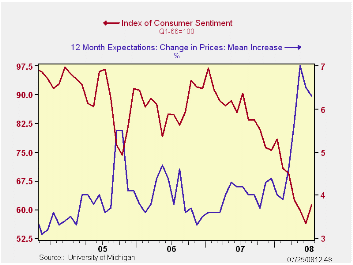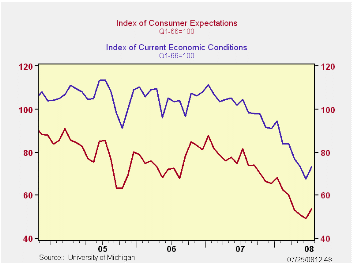 Global| Jul 25 2008
Global| Jul 25 2008Michigan Consumer Sentiment Better Than Expected in July
by:Tom Moeller
|in:Economy in Brief
Summary
The University of Michigan's July reading of consumer sentiment rose 8.5% from June, an improvement from the read for early July which showed a 0.4% uptick versus the June average. The rise beat Consensus expectations for a reading of [...]

The University of Michigan's July reading of consumer sentiment rose 8.5% from June, an improvement from the read for early July which showed a 0.4% uptick versus the June average. The rise beat Consensus expectations for a reading of 56.3 which would have been unchanged from June. The latest level of sentiment was its highest since April.
During the last ten years there has been a 47% correlation between the level of sentiment and the three month change in real consumer spending.
The expectations component of overall sentiment was much firmer than reported at mid-month. The full-month index rose 8.7% to its highest level since March led by a 9.4% rise (-16.0% y/y) in expectations for personal finances. Expectations for business conditions during the next year also were firm and expectations for conditions during the next five years made up about all of a sharp July decline.
The current conditions index rose 8.1% and recovered all of a decline during June. The rise was due to a sharp increase in the index of whether now is a good time to buy large household goods, to the highest level since March (-26.3% y/y). The view of current personal finances also rose and made about half of the June decline (-36.5% y/y).
The opinion of government policy, which apparently influences economic expectations, gave back about half of its June improvement.
The mean expected rate of inflation during the next twelve months slipped m/m to 6.3% versus an initial expectation for 6.9%. During the next five years the expected inflation rate fell further to 3.5%, the lowest level since April.
The University of Michigan survey is not seasonally adjusted.The reading is based on telephone interviews with about 500 households at month-end; the mid-month results are based on about 300 interviews. The summary indexes are in Haver's USECON database, with details in the proprietary UMSCA database.
| University of Michigan | July | (Prelim.) | June | May | July y/y | 2007 | 2006 | 2005 |
|---|---|---|---|---|---|---|---|---|
| Consumer Sentiment | 61.2 | 56.6 | 56.4 | 59.8 | -32.3% | 85.6 | 87.3 | 88.5 |
| Current Conditions | 73.1 | 69.5 | 67.6 | 73.3 | -30.0% | 101.2 | 105.1 | 105.9 |
| Expectations | 53.5 | 48.3 | 49.2 | 51.1 | -34.4% | 75.6 | 75.9 | 77.4 |
Tom Moeller
AuthorMore in Author Profile »Prior to joining Haver Analytics in 2000, Mr. Moeller worked as the Economist at Chancellor Capital Management from 1985 to 1999. There, he developed comprehensive economic forecasts and interpreted economic data for equity and fixed income portfolio managers. Also at Chancellor, Mr. Moeller worked as an equity analyst and was responsible for researching and rating companies in the economically sensitive automobile and housing industries for investment in Chancellor’s equity portfolio. Prior to joining Chancellor, Mr. Moeller was an Economist at Citibank from 1979 to 1984. He also analyzed pricing behavior in the metals industry for the Council on Wage and Price Stability in Washington, D.C. In 1999, Mr. Moeller received the award for most accurate forecast from the Forecasters' Club of New York. From 1990 to 1992 he was President of the New York Association for Business Economists. Mr. Moeller earned an M.B.A. in Finance from Fordham University, where he graduated in 1987. He holds a Bachelor of Arts in Economics from George Washington University.
More Economy in Brief
 Global| Feb 05 2026
Global| Feb 05 2026Charts of the Week: Balanced Policy, Resilient Data and AI Narratives
by:Andrew Cates






